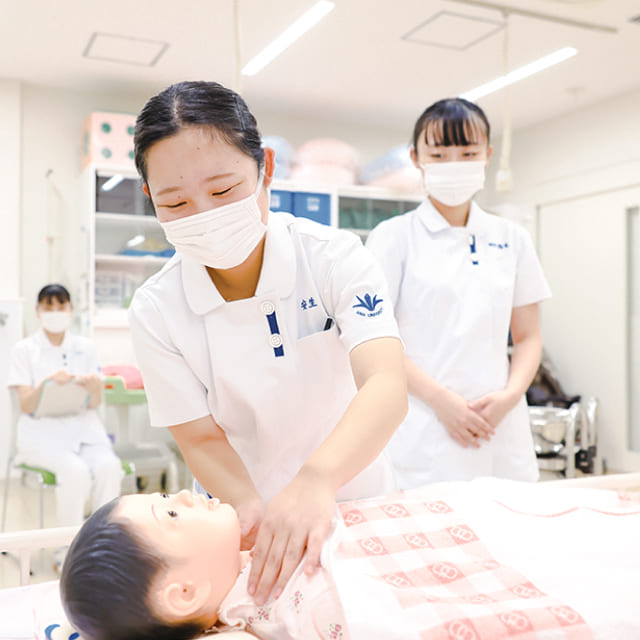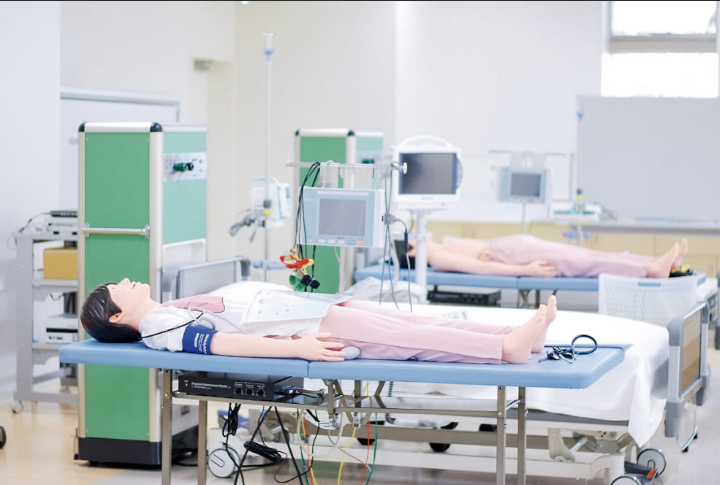
Faculty of Nursing
Develop solid nursing practice skills
Faculty Overview
Cultivate the knowledge, skills, and humanity required for nursing


The medical field is constantly changing, and the skills required of nurses are becoming more advanced and diverse. At Faculty of Nursing of Faculty of Nursing, you will acquire solid nursing practice skills that can be used widely in the medical and nursing fields.
























Faculty Features 01
Human Care Professionals
Intellectual and interpersonal skills, nursing practice skills, and a global mindset
Nurturing nurses who are equipped with

Faculty Features 02
Excellent facilities and environment
Equipped with functional facilities and space for self-study

Faculty Features 03
International nurses
Diverse international nursing training and education by visiting professors from overseas

Faculty Features 04
Aiming to be the ideal nurse
Support for career planning, employment and national exam preparation

curriculum
To become a nurse who can practice compassionate nursing that draws out vitality
Based on a broad-based education, we aim to develop the knowledge, skills, and humanity required for nursing.
First year
Learn basic subjects, general knowledge such as English, and basic nursing skills, which are the foundation for studying nursing.
In the first year, students will learn basic nursing techniques, as well as basic subjects and liberal arts subjects such as English, which are the foundation for learning nursing. In addition, students will have their first clinical training, Basic Nursing Practice I (Understanding Patients), where they will observe nursing practice situations and actually talk with patients to understand the basics of nursing and learn why that assistance is provided.
Second Year
Learn the basics of nursing by focusing on specialized subjects
In the second year, students begin to study specialized subjects within their faculty. Here, they acquire the fundamentals of nursing in each nursing field. In the Human Development Nursing Practicum, students learn the importance and meaning of supporting the lives of healthy people through practical training at nurseries, community comprehensive support centers, daycare services, etc. After that, in Basic Nursing Practicum II (Development of the Nursing Process), students are actually responsible for patients and develop the basic ability to practice nursing that draws out the will to live through support.
Third Year
Participate in clinical training and learn practical nursing skills
In the third year, students will undergo clinical training at hospitals etc. from July to December according to their nursing specialty. They will be divided into small teams and spend one to three weeks in charge of patients, learning and deepening their understanding of the actual nursing process based on what they learned at school.
Before going on to their clinical training, students hone their skills in the on-campus practice rooms so that they can gain the skills necessary for their respective training sites.
Fourth Year
Learn and deepen your nursing knowledge from a broader perspective
In the fourth year, students will have their final year practical training, which includes Healthy Life Nursing Practice III (Health at Home in the Community), Lifelong Development Nursing Practice II (Perinatal Nursing), and Integrated Nursing Practice. In particular, the Integrated Nursing Practice is a culmination of their nursing studies, and students will practice in the nursing field in which they wish to further their learning. In addition, as the National Nursing Examination is just around the corner, students will repeatedly take mock national exams, hold intensive courses by teachers, and hold group study sessions, encouraging each other as they study, in order to pass the national exam and obtain their nursing license.
Career Paths and Qualifications
Post-graduation career paths and qualifications
Main career paths after graduation
Almost all graduates find employment as nurses in medical institutions. In terms of actual employment rate, the school ranks 16th (2023 results)* out of over 550 universities nationwide in the field of "Nursing, Health and Medical Sciences." We sincerely engage with each individual who is fighting illness and practice compassionate nursing that protects the dignity of life. In addition, after graduation, in addition to passing the national nursing exam (obtaining a nursing license), there are also cases where students progress to graduate schools with courses in midwifery, public health nurses and school nurse education, university specialized courses and various vocational schools. *From University Press's "2023 Actual Employment Rate Ranking by Faculty"
Qualifications that can be acquired
The pass rate for the 2022 National Nursing Examination is 98.8%, which is higher than the national pass rate (for new graduates) of 90.8% (95.5%). *The number of test takers and successful candidates includes both new graduates and those who have already graduated.
















